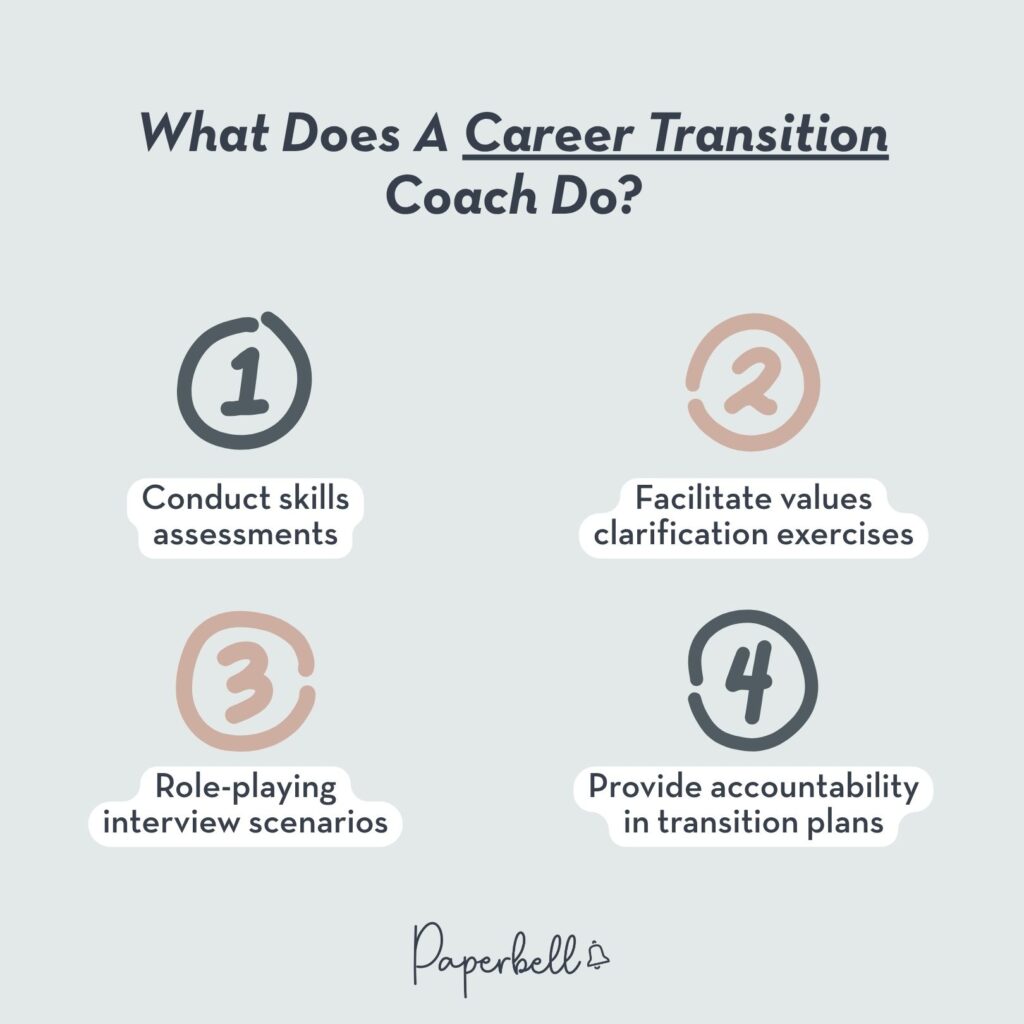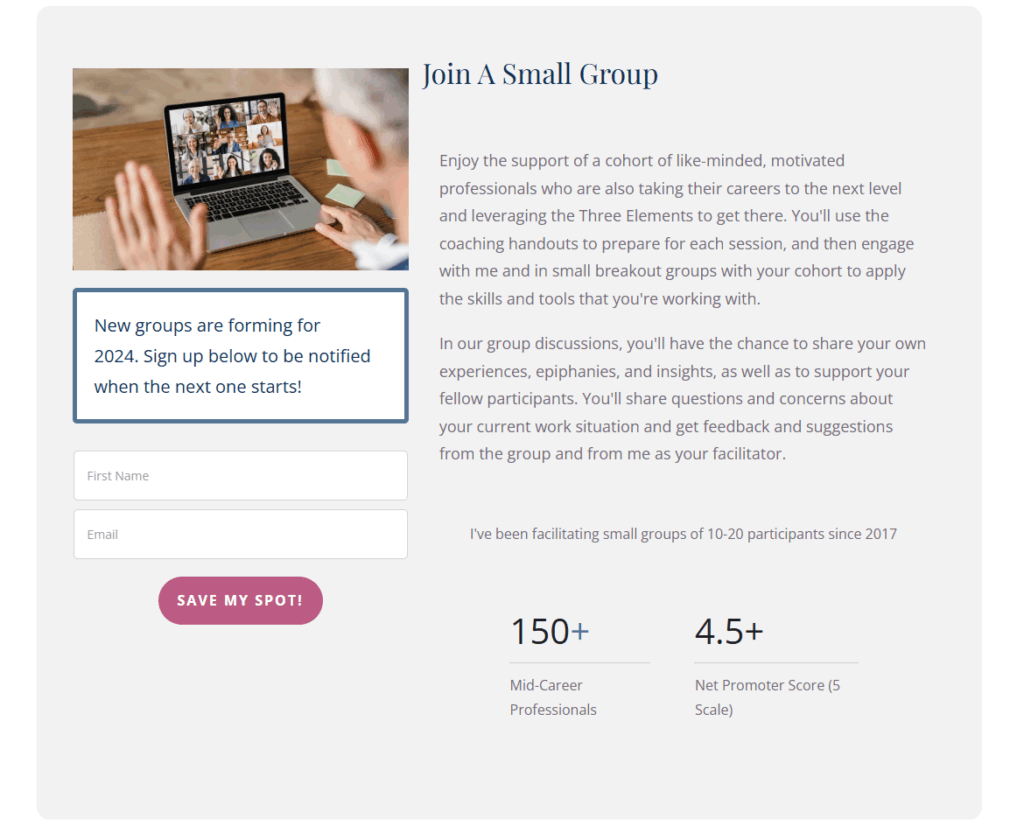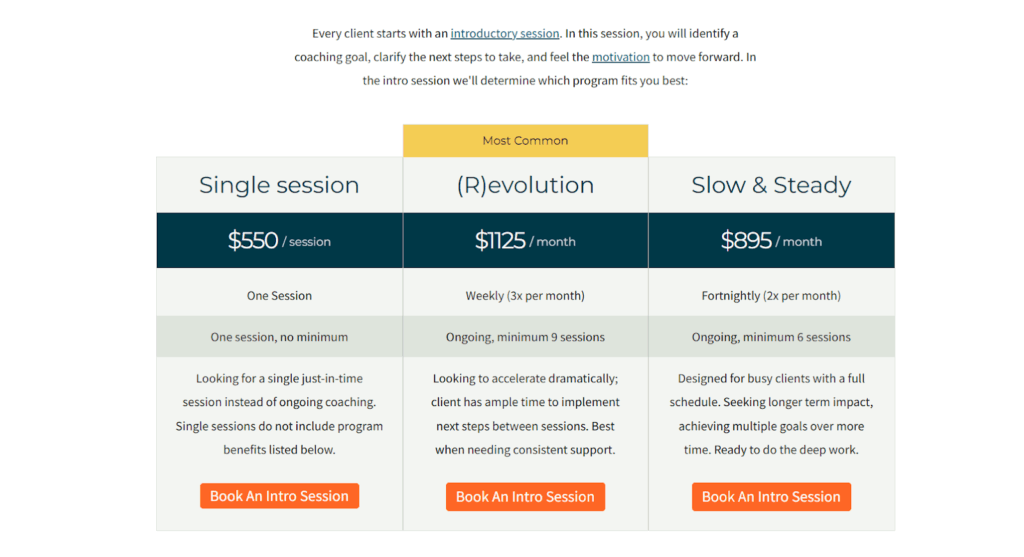If you’ve been paying attention to the headlines lately, you’ve probably noticed a pattern: massive layoffs at tech companies, AI replacing traditional roles, and entire industries experiencing unprecedented shifts.
At the time of writing this article, in the tech sector alone, there have been 368 layoffs with 83,960 people per day in 2025.
For many people, these changes feel overwhelming and uncertain. But for coaches, this volatility represents a significant opportunity to help people navigate one of the most challenging aspects of modern life: career transitions.
If you’re a coach considering this specialty or looking to expand your practice, this guide will walk you through everything you need to know about becoming a career transition coach in today’s unpredictable job market.
What is a Career Transition Coach?
A career transition coach specializes in helping clients navigate significant changes in their professional lives.
Unlike general career coaches or executive coaches who might focus on advancement within a current field, career transition coaches work with people who are making fundamental shifts in their career direction.
The career transition coach job description is broad and includes helping clients:
- Identify transferable skills
- Explore new industries
- Develop job search strategies
- Manage the emotional aspects of career change
- Find a new career or climb the corporate ladder in their current job

Day-to-day activities might involve:
- Conducting skills assessments
- Facilitating values clarification exercises
- Role-playing interview scenarios
- Providing accountability as clients work through their transition plans
What sets career transition coaching as a coaching niche apart from general career coaching or life coaching services is its focus on periods of significant career change. Look at it this way:
- A career coach might help someone get a promotion in their current field to get more satisfaction.
- A life coach might address broader life goals.
- A career transition coach specifically supports people who are moving between careers, new positions, industries, or professional identities.
The types of clients who seek career transition coaching are as varied as the transitions themselves. You might work with:
- Recent graduates who are unsure about their career direction
- Mid-career professionals seeking more meaningful work and are changing careers
- Executives laid off from corporate roles
- People nearing retirement who want to explore encore careers
What these people have in common is that they’re at a crossroads and need expert guidance to move forward with confidence.
When Do People Need a Career Transition Coach?
Career transitions rarely happen in isolation. They’re often triggered by external circumstances or internal shifts that make staying in a current role untenable or undesirable.
Understanding these triggers helps you position your coaching programs and identify potential clients.
1. Supporting Clients Through Layoffs and Job Loss
Layoffs have become increasingly common across industries, with technology companies leading the charge but affecting sectors from media to finance.
When someone loses their job unexpectedly, they often need more than just job search support. They’ll also need help:
- Processing the emotional impact
- Reassessing their career goals
- Potentially pivoting to new fields entirely
This is where career transition coaches provide immense value. You’re not just helping someone find any job. You’re helping them use this disruption as an opportunity to create a more fulfilling career path.
Many clients discover that being laid off was actually a catalyst for positive change they wouldn’t have pursued otherwise, leading to their ultimate success.
2. Navigating an Unstable Job Market
Even people who haven’t lost their jobs are feeling the pressure of market instability. They see automation affecting their industry, watch colleagues get laid off, or realize their skills are becoming obsolete.
These clients seek career transition coaching proactively. They want to make changes before circumstances force their hand.
The rise of artificial intelligence has created particular anxiety around job security. According to McKinsey, 11.8 million workers in industries with shrinking demand due to AI will need to change their line of work by 2030.

Clients often come to career transition coaches asking questions like:
“Will AI replace my job?”
Or:
“How do I future-proof my career?”
Your role becomes helping them identify uniquely human skills and find career paths that leverage these strengths.
How to Start a Career Transition Coaching Practice
If you’ve decided career transition coaching is for you, here’s a step-by-step to get started.
1. Develop the right coaching skills.
Starting a career transition coaching practice requires a combination of coaching skills, industry knowledge, and business acumen.
While you don’t necessarily need extensive corporate experience, understanding workplace dynamics and industry trends is crucial for credibility with clients.
Essential skills include:
- Active listening
- Powerful questioning
- The ability to help clients see possibilities they might miss on their own
- Job search techniques
- Networking strategies
- Current hiring practices across different industries
What if you don’t have all the skills required yet? In that case, taking a career transition coach course or a certification may be your next required step.
2. Get certified as a career transition coach.
Several organizations offer certification options specifically for career transition coaches. And some career transition coach jobs will require certifications, although it’s always up to you if you want to start your own coaching business.
The International Coaching Federation (ICF) provides general coaching credentials, while organizations like the National Career Development Association (NCDA) offer more specialized certifications.
These credentials aren’t always required, but they can improve your credibility and provide valuable training, especially if you don’t have prior skills in this field.
3. Create your coaching packages.
Once you have all the skills and knowledge, which may or may not include coaching certification, it’s time to create your coaching business plan and start setting up your coaching packages.
Before you start, consider using a platform like Paperbell that’s designed specifically for coaches! Paperbell makes it easy to:
- Create professional packages
- Display those packages (as well as testimonials and FAQs) on a beautiful coaching website
- Manage client relationships
- Get booked and paid
In short, you can handle all the administrative aspects of your coaching business in one place. Click here to try Paperbell for free.
Creating specialized packages for transition clients is where you can really differentiate your practice. Following the example of established career transition coaches, you might offer different levels of support.
For instance, John Tarnoff, who specializes in midlife career transitions, offers multiple options, including:
- One-on-one coaching
- Small group programs
- Self-paced courses
- Monthly community sessions

This approach allows you to serve clients with different budgets and support needs.
But there are other ways you can package up your coaching. For example, you could divide your packages by:
- The amount of time and sessions offered
- Specific topics like leadership transitions or complete career pivots
- The level of support provided
For instance, you might offer an intensive program for clients facing immediate job loss, a longer-term program for those planning strategic career moves, and group programs for people in similar situations.
Career Transition Coach Salary and Business Considerations
One of the most common questions from coaches considering this specialty is about earning potential. The truth is, there’s no typical career transition coach salary because pricing varies dramatically based on several factors.
Looking at real examples from established coaches gives you a sense of the range.
Allison Task, a Professional Certified Coach through the ICF, charges $550 per single session or offers monthly packages at $1,125 for three sessions per month or $895 for two sessions per month.

Lucia Knight, who specializes in midlife career transitions, offers a comprehensive self-paced program with 12 months of support for £2,879. That’s equivalent to USD $3,877.
Several factors will influence your career transition coach salary. Certification through organizations like the ICF can command higher rates, as demonstrated by coaches like Allison Task, who holds the Professional Certified Coach credential.
Your experience level, including documented case studies and client testimonials, also impacts your pricing power.
The type of client you serve via your coaching programs also makes a significant difference in pricing. Career transition coaches working with senior executives typically charge more than those serving recent college graduates or entry-level professionals.
This isn’t just about the ability to pay, but also about the complexity and stakes involved in higher-level transitions.
But perhaps most importantly, how you position yourself and your expertise affects your rates. Another name for this is your professional brand.
Coaches who create compelling marketing content that builds trust and demonstrates deep expertise can command premium pricing.
This is particularly true in career transition coaching, where clients are making major life decisions and want to work with someone they perceive as highly knowledgeable. Some of the best career transition coaches can charge thousands of dollars for a single session just because they know how to get results every single time.
FAQ About Career Transition Coaching
What is a career transition coach?
A career transition coach helps career changers navigate significant changes in their professional lives, from layoffs to career pivots to industry switches. They provide both strategic guidance and emotional support for their clients’ professional growth and career plans during the entire process.
How much to charge as a transition coach?
Pricing varies widely based on transition coach certification, experience, and target market. Rates range from under $100 to over $500 per session, with most coaches offering package deals.
How can career coaches help people who have been laid off?
Career coaches help laid-off workers process the change emotionally, identify transferable skills, explore new opportunities, and develop strategic job search plans for their next career move and their job hunt. They can also support personal development in addition to professional growth.
What tool can I use to create my coaching package?
Paperbell is designed specifically for coaches and makes it easy to create packages, manage clients, handle payments, and deliver coaching services all in one platform.
Start Helping More People As A Career Transition Coach
The volatility in today’s job market isn’t going away anytime soon. If anything, the pace of change is accelerating as technology continues to disrupt traditional career paths.
This creates an ongoing need for skilled career transition coaches who can help people not just survive these changes, but thrive through them.
By specializing in career transitions, you’re positioning yourself to serve one of the most pressing needs in today’s workforce.
Helping your clients is much easier when you’ve got the right tools. With Paperbell, you’ll get your own gorgeous, social-friendly website with scheduling, payments, messaging, and more built right in.
Click here to try Paperbell for free and launch your career transition coaching business!










